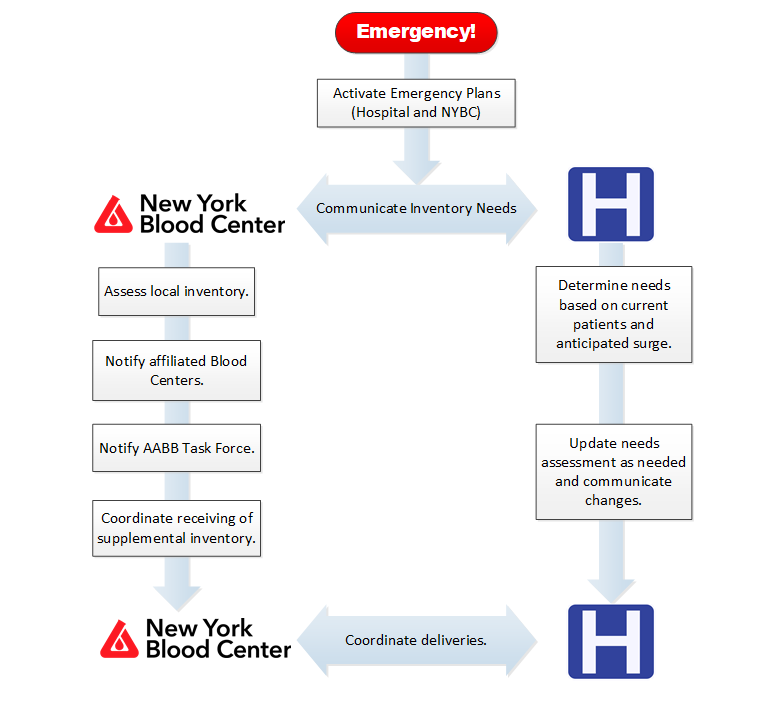In a disaster or emergency situation, NYBC intends to conduct business as usual to the greatest extent possible. However, some circumstances may require us to invoke contingency plans, including modified shipping schedules. Our goal is to meet the needs of patients by maintaining adequate inventories at all times and providing real-time inventory and distribution management in response to an emergency. We will move excess inventory to where it is needed most urgently without compromising any individual hospital’s critical blood supply. The NYBC’s extended network includes partner blood centers on the East Coast and Midwest ready to provide extra support in case of regional disasters.
What should you do?
During emergencies, you should first attempt to communicate your blood needs to us through regular channels. If your hospital uses our on-line ordering system, you should continue to use this method if internet access is available.
- If normal communication links fail, we will activate our emergency numbers
- An alternative method for contacting the department is via email.
NYBC may request certain information from you to assist in planning:
- Do you expect to receive patients or evacuate them?
- How many actual or expected casualties do you expect to receive?
- What is your current available inventory? (estimates OK)
NYBC Customer Care Center is available 24 hours a day 7 days a week to assist you.
| Main Numbers | EMERGENCY Numbers | |
|---|---|---|
| 855-552-5663 or 718-707-3771 | 718-937-7080 or 646-634-4290 (cell) | [email protected] |
If you are unable to reach us through the Customer Care Center, please contact one of these key staff for assistance:
Staff | Phone | |
|---|---|---|
Donna Strauss | 718-752-4610 | |
Sarai Paradiso | 718-752-4689 | |
Victoria Boyd-Lewis, Director | 718-752-4668 917-468-1157 (cell) | |
Shavonne Whaley | 718-752-4661 | |
Lancelot Dyce | 718-752-4663 |
What will NYBC do?
If there is advance warning, such as in most weather related events, NYBC will contact you to plan well ahead of time to confirm you have the blood inventory you need. If we perform clinical procedures in your hospital, our clinical scheduling group will work with you to on a plan for patient procedures.
NYBC routinely moves blood within its network that includes Blood Centers on the East Coast and Midwest. We will immediately evaluate our capacity to meet your needs with local inventory and through our in-network partners. We will also contact the AABB Disaster Response Task Force and request additional assistance if needed.
About our plan
NYBC actively participates with key government and professional organizations to maintain emergency communication channels and to provide a coordinated response. NYBC monitors communications sent via the Hospital Emergency Radio Network. NYBC staff carry Corporate Emergency Access System (CEAS) Cards to facilitate travel on roadways in local disasters.
Information sharing and response is coordinated with the following groups:
Who | What |
|---|---|
AABB Disaster Response Task Force 1.800.458.9388 | Facilitates interactions with government agencies and helps coordinate national or regional movement of blood supply to get inventory where it is most needed. |
GNYHA Emergency Preparedness Coordinating Council | Planning and coordination with hospitals in greater NYC region |
NYC Emergency Management | Interagency coordination of citywide emergency planning and response for all types and scales of emergencies. Hospital Emergency Radio Network |
NYC EM ESF-8 | Emergency Support Function (ESF) #8 – Public Health and Medical Services ESF-8 is one of the four units with the Planning and Preparedness Division at NYCEM - to support the resiliency of New York City’s medical infrastructure through emergency event response planning, information sharing, and partnership building. |
FDNY | Pre-hospital emergency medical care. Sets Mass Casualty Incidents (MCI) Notification Levels for hospitals to determine # of patients they will receive. |
State Departments of Health (NY, NJ, CT, PA) | Facilitate and support emergency operations. |
NYC Department of Health and Mental Hygiene | Facilitate and support emergency operations. |
How can you help?
- Help us keep our contact information current, including Transfusion Service Medical Directors and Laboratory Managers/Supervisors. Please let us know when those contacts change. Don’t forget about points of contact for nights and weekends if they are not the same people!
- Make sure your hospital’s disaster plan addresses blood management in emergency situations.
